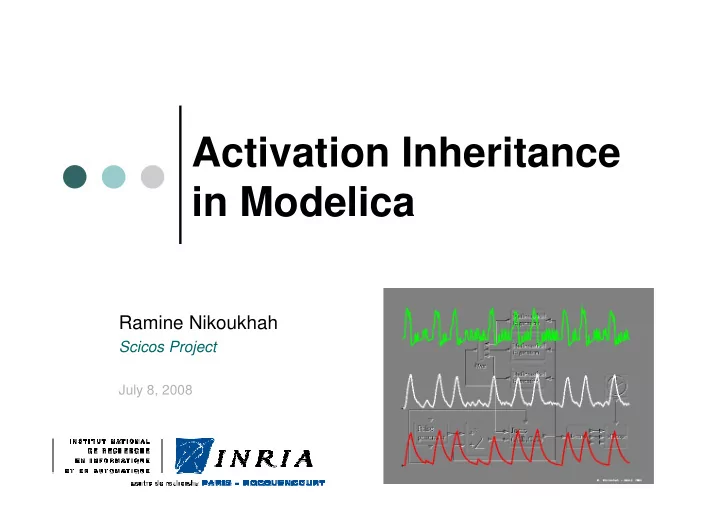

Activation Inheritance in Modelica Ramine Nikoukhah Scicos Project July 8, 2008
Should all events be considered synchronous Consider multi-rate systems Different system components run at different frequencies Parts of the system can run on conditional bases Full or partial synchronization may or may not be needed How to have flexibility to: Leave different components asynchronous Impose easily synchronism when needed EOOLT July 2008 R. Nikoukhah 2
Example Untitled read from + Plant input file - Failure Detection Control Synchronism is not needed in this situation Imposing it creates unneeded constraints EOOLT July 2008 R. Nikoukhah 3
Why not impose synchronization? Due to numerical errors in solvers, zero-crossing times are never exact Counting on simultaneous zero-crossing detections only increases non-determinism In most cases, such synchronisms are unwanted; user does (should) not count on them They lead to an exponentially growing number of event scenarios: virtually impossible to generate efficient static code EOOLT July 2008 R. Nikoukhah 4
Event clocks in Scicos Super Block Event clocks are not basic blocks Delay 0.1 Untitled 1 Two Event clocks do not generate synchronous events EOOLT July 2008 R. Nikoukhah 5
Synchronization problems to avoid Incorrect way of implementing decimation A ctivation sources Fast Slow generate Clock Clock asynchronous events => order of block execution is not predictable. S/H Func. Source EOOLT July 2008 R. Nikoukhah 6
Synchronization problems to avoid Use frequency division: Combination Counter Modulo and If-then-else => frequency division. Division factor set by fixing the value of n, and the phase by the initial state of the counter. The freq_div (Super) block, available in the Events palette, is constructed this way. EOOLT July 2008 R. Nikoukhah 7
Synchronization problems to avoid Correct way of implementing decimation Fast Synchronized events at Clock different frequencies can be implemented If in>0 by sub-sampling the Counter Modulo n fast clock then else S/H Func. Source EOOLT July 2008 R. Nikoukhah 8
Example of a multirate system ������� ��������� Systems diagnosis with controller reconfiguration ����� Synchronization is required ���������� EOOLT July 2008 R. Nikoukhah 9
Sample clocks 1 3 0 0 S-CLK S-CLK Virtual blocks, replaced by one Event clock and sub-sampling Uses slowest clock generating all events using sub-sampling: modulo counter and conditional blocks Clock algebra similar to Simulink Resulting events are synchronized Transparent to the user EOOLT July 2008 R. Nikoukhah 10
Modelica vs Scicos unitDelay gain 1 z 1/z 1 k=1 In this case Event Clock or Sample Clock can be used in Scicos No synchronization problem EOOLT July 2008 R. Nikoukhah 11
Modelica vs Scicos unitDelay unitDelay1 1 1 1/z 1/z z z 1 1 The two diagrams are not equivalent 0 0 Scicos diagram is not synchronous S-CLK S-CLK The correct formulation is: 1/z 1/z EOOLT July 2008 R. Nikoukhah 12
Other solution: explicit event signals unitDelay unitDelay1 1 1 be : z z 1/z 1/z Other solution to synchronize blocks is to drive them explicitly with synchronized event signals Events need not be periodic EOOLT July 2008 R. Nikoukhah 13
Other solution: activation inheritance unitDelay unitDelay1 1 1 : z z 1/z 1/z A/D Blocks, in the absence of activation, inherit their activations through regular inputs Events need not be periodic EOOLT July 2008 R. Nikoukhah 14
Activation inheritance Simple and non-ambiguous rules Provides a data-flow like behavior Inheritance mechanism does not considerably modify the compiler: missing activation signals added at a pre-compilation phase Can also be used in applications where the activations are not periodic EOOLT July 2008 R. Nikoukhah 15
Modelica: method 1 unitDelay 3 0 1 S-CLK z 1/z 1 1 Consider a masked Scicos block to include period information in the block Compatible with current Modelica Discrete library if special interpretation used for the keyword sample EOOLT July 2008 R. Nikoukhah 16
Modelica: method 2 1/z 1 z model Memory input Event e1; output Real y; Introduce a new type “Event” in input Real u; Modelica and include an Event discrete Real z; input port for this block equation when e1 then Defining events as new types in z=u; Modelica has other advantages y=pre(z); end when; end Memory; EOOLT July 2008 R. Nikoukhah 17
Modelica: method 3 unitDelay 1/z 1 z model Memory output Real y; Use activation inheritance input Real u; mechanism discrete Real z; equation Allow “discrete” equations in z=u; “equation section where the y=pre(z); activation in inherited end Memory; EOOLT July 2008 R. Nikoukhah 18
Conclusion Before considering to rewrite the discrete block library in Modelica, synchronization issue need to be clarified All three mechanisms can be used but result in different libraries Very relevant to current discussions about the controller specification and real-time code generation EOOLT July 2008 R. Nikoukhah 19
Recommend
More recommend